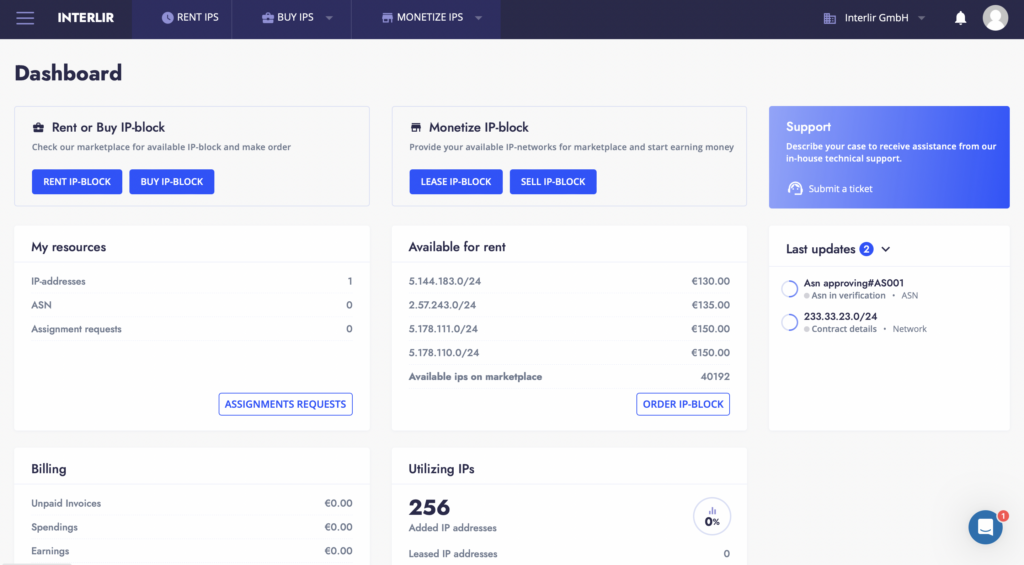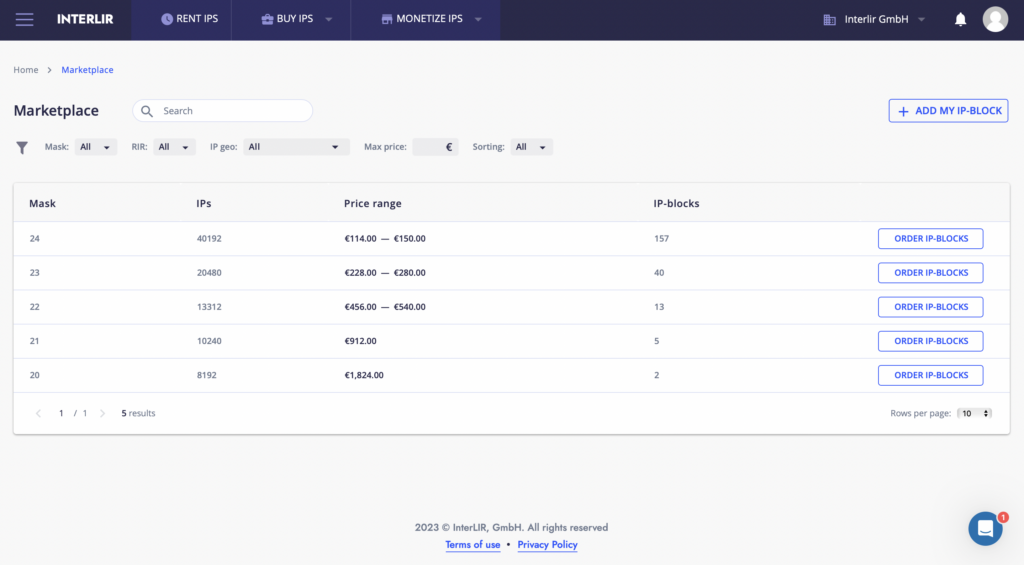IPv4 addresses are a finite resource that may deplete sooner than anticipated. By leasing IPv4 addresses, you can secure the necessary IP space for your business in 2024. Procrastinating on this decision may result in your business falling behind, so it is advisable to begin planning without delay. This comprehensive guide will provide insights into the nature and functionality of IPv4 addresses and offer guidance on the process of leasing them.
Leasing IPv4 addresses can be a suitable option if you have excess addresses that are not needed immediately or in the long run. This approach is particularly beneficial for small businesses with a limited number of employees but require multiple public IP addresses. An IPv4 address is a numeric identifier assigned to devices connected to an IP-based computer network. It consists of four numbers separated by periods, known as an IP address, and is represented in dotted-decimal notation (e.g., 192.168.2.1). Certain numbers within the address range have reserved purposes and cannot be leased or purchased from service providers. These reserved numbers typically include low-numbered addresses, such as 0 and 255, although regulations may vary across countries.
This year, the available pool of IPv4 addresses has been significantly depleted, leaving only a limited number of addresses for allocation. Regional Internet Registries (RIRs) now distribute the remaining addresses in blocks of 256. By 2024, it is expected that all freely available IPv4 addresses will have been exhausted, unless alternative protocols or systems, such as IPv6, are adopted or developed.
The challenge arises from the fact that not everyone is willing to use IPv4 addresses and is actively seeking alternatives. While there are intriguing ideas for alternative protocols like Web 3.0, their widespread implementation is still years away. Therefore, obtaining IP addresses from network providers remains necessary. The advantage is that you can acquire these addresses well in advance. However, there is no certainty as to whether you will actually need them, as it depends on the speed of alternative solutions and the number of devices you own.
Leasing an IP address from a network provider can be done through various methods. For instance, Google offers leased IP addresses as part of their cloud services. Google Cloud Interconnect allows customers to obtain public IP addresses across different continents, along with options for private interconnects between data centers to ensure performance and security. This is just one example among many alternatives available through providers like T-Mobile and InterLIR to acquire blocks of IP addresses when they become accessible.
The availability of IPv4 addresses is becoming scarce, and it is important to plan ahead to ensure you have enough addresses for your devices. Leasing IPv4 addresses can be a solution to this problem. Instead of letting your unused IP addresses sit idle, you can lease them to businesses that require additional addresses. This not only helps you generate profits from your unused assets but also provides recurring income each month.
To lease IPv4 addresses, you need to create a sub-allocation pool consisting of contiguous address blocks, such as /8s, which can contain a range of individual /24 blocks. The lessee pays for a single allocation from this pool to obtain the desired number of IP addresses. After the lease expires (typically after five years or by mutual agreement), you regain control of the blocks, allowing you to reuse them as needed. This leasing model benefits everyone involved, as you can generate revenue, lessees gain access to address space without waiting for future IPv4 allocations, and internet users experience uninterrupted connectivity during transitions between leased blocks.
Some may worry that leasing addresses will deplete IP address space for internet users. However, leases are temporary, and after the lease term, the blocks are returned to the lessor, who can then allocate them to others. Leasing actually encourages ISPs and businesses with unused address stockpiles to make them available instead of hoarding them. This additional availability of IPv4 addressing space helps meet address assignment needs and prevents costs from escalating in the long run.
Leasing unused IP addresses has several benefits. You retain control over your unneeded addresses and regain full ownership after the lease term. You can generate recurring revenue without selling or transferring your existing address space. It’s a mutually beneficial arrangement for all parties involved.
If you’re interested in leasing your unused IP addresses, InterLIR can provide more information, assistance with setting up a sub-allocation pool, and guidance on managing the leasing process. They offer support regardless of whether you use RIPE DB or legacy RIPE tools. Additionally, InterLIR offers training sessions to help you understand the ins and outs of leasing IP addresses and what happens when leases expire. Feel free to reach out to them for further assistance.
Since 2010, countries like Germany, China, and India have engaged in leasing IP address space to ISPs. This has given rise to a growing industry of providers that offer short-term rental options for IP addresses. This arrangement allows organizations to fulfill their immediate address space needs without making long-term commitments. It is particularly beneficial for organizations that require only 1-2 blocks of IP addresses per year.
The cost of renting IP addresses can vary depending on the provider and the size and duration of the block needed. Some providers even offer discounts for renting multiple blocks, making it a cost-effective option. For instance, if you lease two blocks of 1024 IP addresses each, you may receive a 3% discount on the total price. This makes leasing an appealing choice for smaller organizations with immediate requirements who prefer to avoid long-term contracts or higher prices associated with permanent IP address space.
When you lease IP addresses from a provider like IPv4 Provider, they take care of maintenance and technical support for the leased address space. This means you don’t have to worry about setting up or managing the necessary equipment.
Overall, leasing IP addresses offers organizations flexibility and cost savings, allowing them to meet their short-term needs without being tied to long-term commitments or higher expenses. Providers like IPv4 Provider play a crucial role in facilitating this arrangement and supporting customers throughout the leasing process.
If you have identified a block of IP addresses that you are interested in renting or leasing, it is important to inquire about pricing and rates. The cost of IP addresses can vary due to factors such as availability and location. Since 2021, prices have increased by 100%, with the current rate being around $50 per IP address. These services not only offer cost savings but also provide the option to bundle multiple IP address ranges into a single lease. This can be advantageous because purchasing a large number of IPs outright, such as a /16 block with 65,536 addresses, can be extremely expensive and result in a significant amount of unused IP space.
Renting IP addresses is not limited to businesses and government entities. Home owners are also turning to IP address leasing and rental services, especially as internet connections become essential in many aspects of daily life. A typical home may require a static public IP address for its primary connection and dynamic IP addresses for wireless routers and home networks. Regardless of your specific needs, you can lease an IP address from various providers located across Europe and other regions worldwide.
When IPv4 addresses become available for lease, there will be a significant interest from ISPs, organizations, and other entities that currently obtain IP addresses from RIRs like ARIN or RIPE. Germany, in particular, has already started preparing for a leasing market, and it remains to be seen whether this trend will extend beyond Germany. If you’re launching a new network, especially as a data center company requiring a large block of IP addresses, renting them on an international level is likely your best option.
Leasing IP addresses is often more cost-effective than purchasing a large block of static IP addresses. Organizations relying on public Internet backbones for their operations may gain access to new address blocks through service providers and regional network operators. Dynamic pooling, where leased addresses become part of a pool that can be assigned to different devices at different times, can help prevent address exhaustion and ensure the availability of IPv4 addresses in the long term.
Renting IP addresses from existing network operators, especially in Germany, provides a viable option for accessing a large pool of IP addresses for both new and established networks. As more IP addresses become available, it is likely that other countries will also create leasing markets. However, even if your country does not establish an IPv4 address-leasing market, international access to leased address blocks is readily available through many ISPs. Major national providers like Comcast, Deutsche Telekom, NTT Communications, and Singtel have already expressed their willingness to rent out different IP addresses.
If you’re interested in leasing an IPv4 address, InterLIR offers two options: signing a contract directly with them or using their marketplace platform. Leasing through InterLIR provides flexibility, although it requires a contract specifying the lease duration. Alternatively, you can rent addresses from their marketplace, with InterLIR managing payments and addressing any disputes that may arise during the lease period. Simply inform them of the desired number of addresses, and they will handle the rest. Their leasing system is reliable and secure, ensuring a hassle-free experience. Leasing an IPv4 address from InterLIR allows you to focus on your business without concerns about address availability in 2024. The cost to buy IPv4 addresses is reasonable, and InterLIR provides comprehensive support, including document verification, data updates, consulting services, RIPE database updates, and interaction with the RIPE NCC.



Alexei Krylov Nikiforov
Sales manager